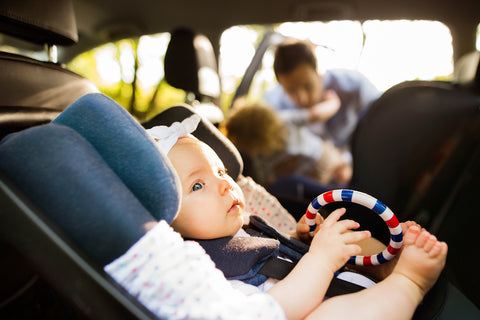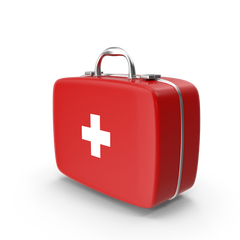
With the recent devastation brought on by Hurricane Michael, we've heard from breastfeeding mothers who have questions about what they can do to be prepared in case of an emergency situation. Natural disasters can cause our daily, normal lives to be disrupted and put families in situations where they do not have electricity, clean running water, or even have to be displaced from their homes.
Breastfeeding mothers had questions like, “ Should I continue to breastfeed? If I’m weaning, should I stop? What important supplies should I put in my emergency kit? and, How long can pumped milk stay frozen?”

Here's some helpful information for those breastfeeding in the event of an emergency or natural disaster.
If Possible, Continue Breastfeeding
First, and most importantly, do not stop breastfeeding or attempt to switch to formula during an emergency situation. Interrupted breastfeeding, even for a brief period, can be detrimental to your breastfeeding relationship.
Breastfeeding is the absolute best option for your baby during a natural disaster. The CDC advises, “Breast milk helps protect babies from diseases such as diarrhea and respiratory infections and provides the calories and nutrients babies need. This protection is especially important during natural disasters when contaminated water and unsanitary environments can increase the risk of disease.” For many who do not breastfeed, a worst case scenario would be having to desperately search for a can of formula and clean water to feed their baby.
Weaning Can Wait
But, what if you are in the process of weaning? During an emergency situation, it is best to discontinue weaning until the danger has passed and everything is back to normal. The stress of a natural disaster can be enough for children to deal with, and the transition of weaning could be overwhelming for both mother and baby during this uncertain time.
Relactation Is Possible
If you have recently weaned or switched to formula, it is possible to start breastfeeding again, this is called relactation and could potentially be your only option if you are without water or formula. Learn more about relactation here.
When you can't, cup feeding/ donor milk or wet nursing is a great alternative.
Important Milk Storage Information
A full freezer will continue to keep everything frozen for at least 48 hours after you lose power as long as you keep the door closed. If you are anticipating a power outage for longer, or your milk has already started to thaw, you can add 2-3 previously frozen breast milk bags in a larger ziplock bag filled with water and freeze it all together. After the water freezes will help to keep the milk bags inside frozen for a longer time. An emergency generator can be used to keep power to your freezer, or if you live somewhere where it snows, you can even store your milk in a snowbank. You can find more milk storage tips and tricks here.
Supplies to Keep in Your Emergency Kit

When you live in a region where destructive weather patterns are generally anticipated seasonally, you most likely already have a kit or a practiced plan of action. So, aside from the basics, food, water, diapers, batteries, flashlights, and charging banks, we also suggest adding these breastfeeding supplies to your checklist:
- Manual pump, (or learn how to hand express)
- Disinfectant wipes
- Baby wipes can be very useful to clean our bodies when water is not available
- Bottle cleaning supplies (If bottle feeding)
- Bottles and Nipples
- Travel cooler to transport pumped milk
- Ice packs to keep milk frozen
- Comfortable nursing bras
- Change of clothes
- Lacti-Cups
- Baby Carrier or wrap
- Nursing cover (in case you're somewhere where you prefer to have privacy)
- List of Important Phone Numbers and Contacts
- Medications
- First aid kit
As a parent, it’s extremely important to know what to do during natural disasters. And when you're a mom who is breastfeeding, the safety and well-being of your little one become a huge concern. Make a plan and discuss it with your partner and family members. Include a meeting place in case you get separated.
You never know when an emergency could potentially happen, so its best to be prepared. Most importantly, stay calm. During uncertain times and difficult transitions, your children will be looking to you to know what to do and how to feel. It’s important to stay level-headed in order to make important decisions and keep your children calm
Additional Resources:
WHO - Importance of Breastfeeding in Natural Disasters
United States Breastfeeding Committee
CDC Breastfeeding & Disaster Planning added
https://www.cdc.gov/features/disasters-infant-feeding/index.html
Disaster-preparedness-breastfeeding-matters-during-emergency
